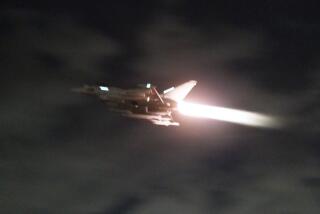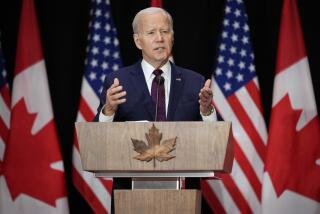Rumsfeld Warns Syria, Iran Against Aiding Iraqi Forces
- Share via
WASHINGTON — Defense Secretary Donald H. Rumsfeld warned Syria and Iran on Friday against assisting Iraqi forces or “complicating” the mission of U.S. and British troops trying to overthrow the regime of Saddam Hussein.
Speaking to reporters at the Pentagon, Rumsfeld said the United States has evidence that shipments of military supplies and equipment -- including night-vision goggles that could undercut a U.S. advantage in fighting -- have been crossing into Iraq from Syria.
He also said hundreds of Iranian-trained militants have moved into Iraq from Iran. He warned that they will be treated as a threat to U.S. and British forces.
“We don’t want neighboring countries or anyone else, for that matter, to be in there assisting the Iraqi forces,” Rumsfeld said. He added that the equipment from Syria poses “a direct threat to the lives of coalition forces. We consider such trafficking as hostile acts, and will hold the Syrian government accountable.”
Syria, a staunch opponent of the U.S.-led invasion of Iraq, called the claims “unfounded.”
“What Donald Rumsfeld said about the transportation of equipment from Syria to Iraq is an attempt to cover up what his forces have been committing against civilians in Iraq,” the Syrian Foreign Ministry said.
Syria’s U.N. ambassador, Mikhail Wehbe, said: “It’s a mark of failure of the invasion, the American-British invasion of Iraq.”
Senior Bush administration figures had been working until now through diplomatic channels to try to convince Syria and Iran to stop the flow of military supplies and fighters into Iraq, administration officials said.
They said the U.S. has been pressing Syria for more than a year to halt Syrian companies’ shipment to Iraq of military supplies and so-called dual-use material that could be adapted for chemical or biological weapons.
In the last month, officials said, the U.S. Embassy in Damascus warned Syria that Washington would hold the government of President Bashar Assad responsible if equipment or goods that moved through his country was used against American forces in Iraq. But U.S. officials said Friday that Damascus has not acted to stop the commercial traffic.
“We’ve been gravely concerned about this issue,” said a well-placed administration official who requested anonymity.
The Bush administration’s accusations against Syria follow complaints in the last week that Russian firms are selling anti-tank guided missiles, jamming devices and night-vision goggles to Iraq.
Russia’s foreign minister, Igor S. Ivanov, has denied the allegations.
U.S. officials have also been worried about what they call the growing number of Iranian-backed fighters deployed in Iraq. The troops, belonging to the Badr Brigade and opposed to Saddam Hussein, have moved into Kurdish-held northern Iraq.
On Friday, Rumsfeld said that the presence inside Iraq of hundreds of Iraqi Shiite Muslim militants armed by Tehran would not be tolerated.
The brigade, opposed to any foreign dominance of Iraq, is believed to have as many as 15,000 fighters, as well as antiaircraft guns, dozens of tanks, heavy artillery, rockets and mortars.
Rumsfeld said U.S. forces are under orders to consider the militants “combatants.” Under questioning, he said the militants have “not yet” been hostile to the U.S.-led invasion force.
There was no immediate comment from Iranian officials.
Kurds are wary of the incursion. Some see the Badr Brigade as a counterweight to hostile Turkish forces that might flow into northern Iraq. Others, however, fear that the presence of the brigade will make such an advance by the Turks more likely.
The Badr’s movements would serve the interests of Iran by helping to prevent the war from spilling across the border and to suppress groups based in northern Iraq that are hostile to the regime in Tehran.
*
Times staff writer Greg Miller in Washington contributed to this report.
More to Read
Sign up for Essential California
The most important California stories and recommendations in your inbox every morning.
You may occasionally receive promotional content from the Los Angeles Times.













